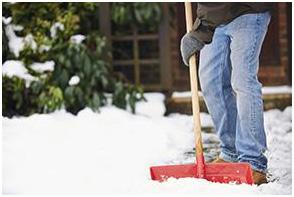Welcome to the November issue of my monthly newsletter!
The holidays are just around the corner, as is the new year! With that, now is a great time to start planning for a debt-free holiday and thinking about winter-proofing your home! Plus, all you need to know about fixed vs. variable rate mortgages heading into the New Year.
Thanks again for your continued support!
Fixed vs. Variable Rate Mortgages
 If you are new to the world of mortgages, you probably have a lot of questions – such as whether to choose a fixed-rate mortgage or variable -rate mortgage. Even experienced homeowners can sometimes struggle with this and may wonder if they made the right choice or if they should switch.
If you are new to the world of mortgages, you probably have a lot of questions – such as whether to choose a fixed-rate mortgage or variable -rate mortgage. Even experienced homeowners can sometimes struggle with this and may wonder if they made the right choice or if they should switch.
Before we get to that, let me explain the differences between fixed and variable-rate mortgages. A fixed-rate mortgage is just that – a fixed amount of interest that you would pay for the term of the mortgage. A variable-rate, on the other hand, is based on the current Prime Rate and can fluctuate depending on the markets. Fixed rates are typically tied to the world economy where the variable rate is linked to the Canadian economy.
Why Consider a Fixed-Rate Mortgage?
First-time home buyers typically love the stability of a fixed rate when just entering the mortgage space. The pros of this type of mortgage rate is that your payments don’t change throughout the life of the term. However, should the Prime Rate drop, you won’t be able to take advantage of potential interest savings. Adversely if prime increases your fixed rate and payment are protected against the hike.
Why Consider a Variable-Rate Mortgage?
Variable-rate mortgages are based on the Prime Rate in Canada. This means that the amount of interest you pay on your mortgage could go up or down as the economy fluctuates. When considering a variable-rate mortgage, some individuals will set standard payments (based on the same mortgage at a fixed-rate), this means that should Prime drop and interest rates lower, the are paying more to the principal as opposed to paying interest. If the rates go up, they simply pay more interest instead of direct to the principal loan. Other variable-rate mortgage holders will simply allow their payments to drop with Prime Rate decreases, or increase should the rate go up.
If you are presently considering converting your fixed-mortgage to a variable-rate mortgage, it is important to consider potential penalties. If you are currently up for renewal, you should have no issues with switching your mortgage, but it is always important to check your contract before making any changes that could “break” the mortgage. Penalties are determined differently depending on your current rate and term and the lender you signed with.
What about the economy!
If the recent economic instability has you worried, and you want to change your variable-rate mortgage to a fixed one, the penalty will likely be equal to three months worth of interest payments. For those of you who are looking to take advantage of the decrease in interest rates, and want to switch your fixed-rate mortgage to a variable-rate one, you will likely be looking at an Interest Differential Penalty. Depending on your mortgage amount, this may be a small price to pay to achieve a lower interest rate and reduce your payments.
Regardless of whether you are leaning towards fixed or variable, or want to change your mortgage, it is always a good idea to review your mortgage contract and finances before making any changes. I would be more than happy to discuss your current financial situation and review all the options with you to ensure you are making the best choice for your future.
How to Enjoy a Debt-Free Holiday
 The holidays are coming up! As much as these celebrations bring us joy and harmony, they can also bring us stress. This is particularly true when it comes to your finances! However, don’t lose hope that this will be another draining year on your pocketbook. In fact, with a little planning, there are a few ways you can make sure your holidays are stress and credit-free.
The holidays are coming up! As much as these celebrations bring us joy and harmony, they can also bring us stress. This is particularly true when it comes to your finances! However, don’t lose hope that this will be another draining year on your pocketbook. In fact, with a little planning, there are a few ways you can make sure your holidays are stress and credit-free.
Manage Your Expectations:
Did you find the holidays refreshing last year, or were they somewhat draining and you’re still trying to figure out how to pay off your credit card bills? If you are someone that wants your holidays to be energizing and provide that feeling of togetherness, there is more to it than just spending money. Once you decide your expectations, it becomes easier to work towards things that create that result.
Determine Your Holiday Goals:
Are you looking to plan an extravagant black-tie party or have a more low-key celebration? Maybe you just want to hang out with lots of family and friends and enjoy some good food? Or maybe you usually getaway and are finding yourself homebound this year. No matter how you normally spend your holidays, sharing your thoughts with the family will help determine your goals and come to a decision that works for everyone!
Create a Budget:
Once you have decided your expectations and goals for the holiday, it is time to create your budget. A little planning can go a long way to creating a credit-free holiday and will help you spread out the costs. The first step is to create a list of everything you need, from individual gifts to decorations to baking ingredients and meal items to clothing!
Start Now:
Early planning can make all the difference when it comes to the holidays. Instead of lumping your entire budget into a couple of paychecks, try keeping an eye out for gift ideas and cute decor all year long. While it may be too late this year, it could be a good strategy to try for 2021! Starting early will help reduce stress and give you more opportunities to scoop up incredible deals throughout the year, which means you can spread your budget even farther!
Accept Help:
While I know many of us try to do everything during the holidays so our families can just enjoy themselves, it is important to remember that the holidays are a time when we are supposed to support each other, and celebrate together! If you are hosting a dinner this year, don’t be afraid to ask your family to bring appetizers or drinks. If you are buying gifts for friends, set a limit or challenge everyone to make something by hand! Homemade gifts can often feel more special and it creates a fun exchange for you and your friends. There are many incredible ways to reduce stress and help get others involved so that the holiday is perfect for everyone.
It is easy to get caught up in the consumerism and expectations of the holidays. Is dinner perfect? Did you buy enough gifts? Did you invite everyone? Is everyone happy? But don’t forget yourself in your efforts to please others.
Even though the holidays can feel hectic, it is important to celebrate YOU and be grateful for what you have – even if you weren’t able to check off all the boxes. Life happens, but the most important thing is that we celebrate when we can.
The holiday is YOURS, so make sure you spend it whichever way brings you the most joy – and the least amount of stress on your pocketbook.
Winter Proofing Your Home
 With the changing of the seasons, it can be a good time to take stock of your home and ensure you are ready for the colder weather. To help you feel more comfortable, save on bills and prevent future repair costs, there are some simple things you can do to prepare for the coming season. Tending to minor problems yourself, or booking a professional now, will save you time and aggravation later when poor weather makes it harder to tackle home maintenance jobs.
With the changing of the seasons, it can be a good time to take stock of your home and ensure you are ready for the colder weather. To help you feel more comfortable, save on bills and prevent future repair costs, there are some simple things you can do to prepare for the coming season. Tending to minor problems yourself, or booking a professional now, will save you time and aggravation later when poor weather makes it harder to tackle home maintenance jobs.
Service Your Heat Source:
Before Winter starts, be sure to have a professional check and clean your heat sources. You should have your chimney cleaned out if using wood heat or make sure to update your oil heater’s filters and service gas furnaces regularly.
Check Your Pipes:
Checking pipe joints for leaks that could cause rot and damage will save you trouble in the future. Repair any cracks you find, especially those around electrical outlets and alarm system lines. You can also consider foam pipe insulation, which is fairly easy to install and could help prevent energy loss and potential water damage from frozen pipes.
Mind the Gaps:
Search exterior window frames, doors and siding for cracks and gaps where water could get in. Doors and windows commonly have gaps that let cold in and heat out. Some will be easy to fill or fix yourself but could save you money and damage down the line!
Insulation is Key!
On a snowy day go outside and look at your roof; you should see snow on the roof. If you can see your roof that means the attic is not insulated well and heat is escaping and melting the snow. If this is the case, you will want to have it repaired and packed to ensure you are not losing excess heat during the winter months.
Create a Storm Kit:
A storm kit is a handy source of essential items in the event of losing power. Consider what you and your family might need, such as a flashlight with new batteries, candles, matches, a portable radio, water and snacks. Keep your kit somewhere easy to access!
